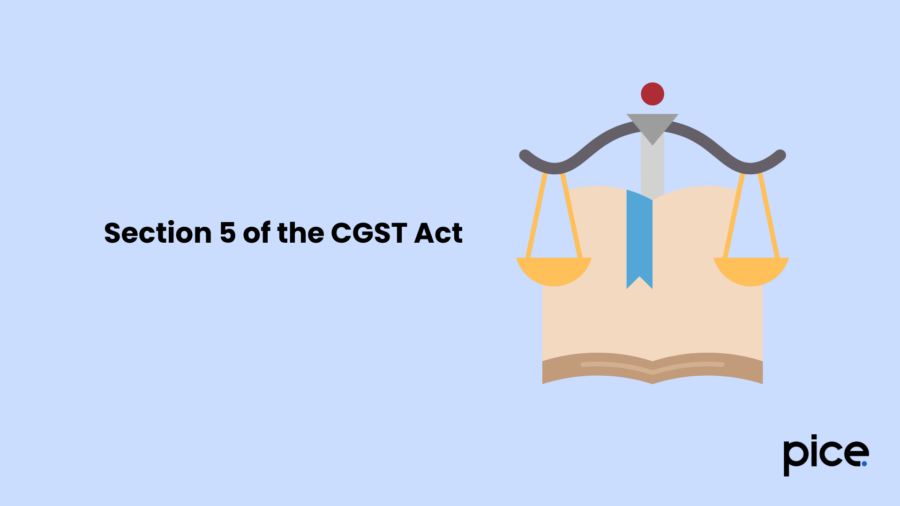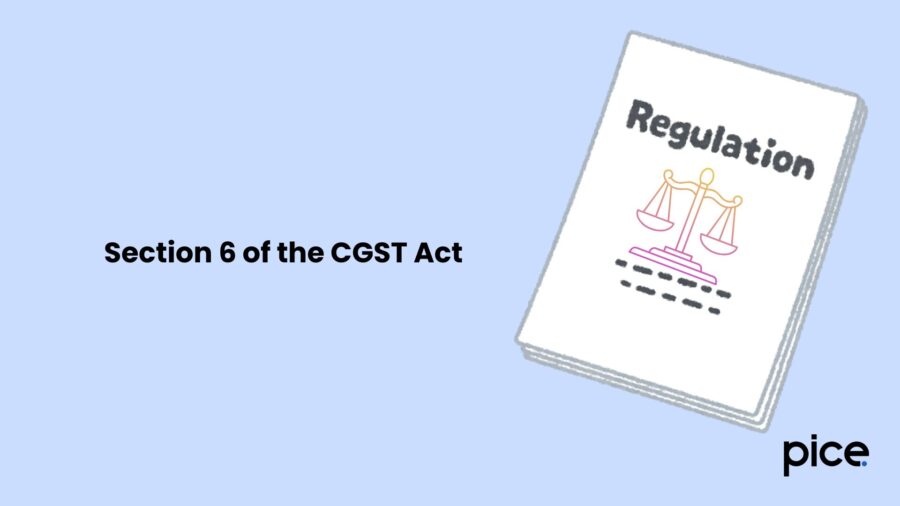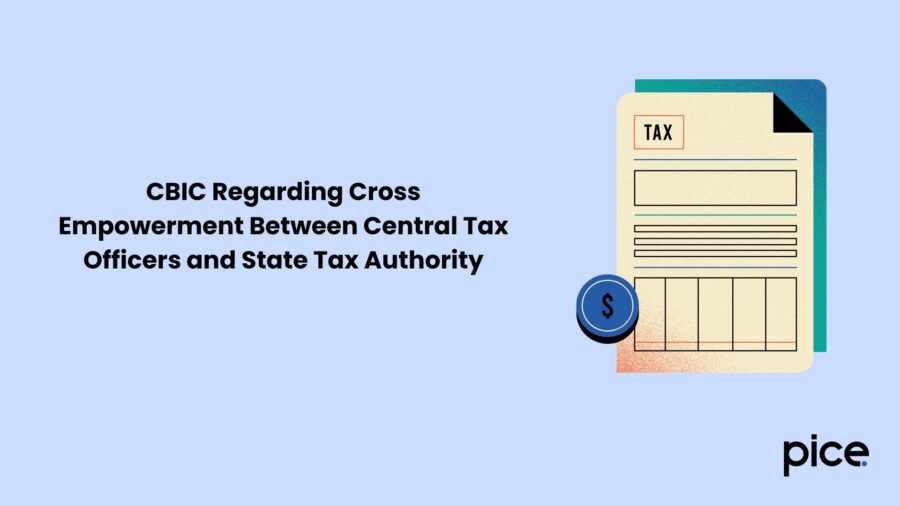A Guide on Cross Empowerment in GST
- 23 Jul 25
- 9 mins

A Guide on Cross Empowerment in GST
Key Takeaways
- Section 5 empowers tax commissioners to delegate authority but prohibits Appellate Authorities from administrative roles.
- Section 6 allows officers from either authority to act as proper officers, reinforcing cross empowerment.
- Once proceedings are initiated, no other officer can start a parallel process on the same matter.
- The CBIC clarifies that the authority initiating an action must complete all stages of adjudication and appeal.
- Jurisdictional clarity prevents duplication and ensures legal consistency in GST enforcement.
Ideally, upon GST registration, a taxpayer is assigned to either the Central or State tax authority, which handles all related matters. However, it has been observed that taxpayers are sometimes subjected to proceedings by the other authority, leading to confusion over jurisdiction.
This issue, known as cross empowerment under GST, raises questions about the validity of such enforcement actions.
In this blog, we will outline key sections and official clarifications that address this ambiguity.
Section 5 of the CGST Act

Section 5 of the Central Goods and Services Act allows officers the power to discharge functions. The Commissioner is further allowed to delegate his powers to officers or subordinates. On the other hand, an Appellate Authority cannot exercise the power and discharge of duties that have been provided to officers.
The Central Board of Excise and Customs are liable to appoint officers to exercise such powers and discharge the duties under the CGST Act.
Here are the provisions of Section 5 of the CGST Act, 2017:
- Under certain conditions and limitations, an officer of the Central Tax can exercise power and discharge specific duties that have been appointed to him under the CGST Act.
- The officer can further exercise the duties to a subordinate if the Central Tax officers impose such duties.
- The Commissioner can additionally delegate powers to officers who are subordinate to him.
- An Appellate Authority is not permitted to carry out the responsibilities or exercise the powers assigned to any other Central Tax officer.
Here are the provisions of Section 5 of the Delhi Goods and Services Tax Act (DGST Act), 2017 are as follows:
- Subject to certain terms and conditions, the Commissioner might impose certain duties on a State Tax Officer, who needs to exercise the duties.
- The State Tax Officer can further exercise the power to delegate the duties to someone subordinate to him.
- The Commissioner might further delegate his duties to an officer on his/her behalf to exercise power.
- An Appellate Authority cannot exercise the power and appoint duties to officers or any other individuals.
Section 6 of the CGST Act

Section 6 of the Act further allows the authorisation of State or Union Territory Tax Officers, subject to certain conditions as notified by the Central Government on the Council's recommendations, to be proper officers based on the Act.
Here are the provisions of Section 6 of the CGST Act, 2017:
- Officers who are appointed under the State Goods and Services Tax Act or the Union Territory Goods and Services Tax Act are the proper officers for the Act's purpose, without any prejudice to the Act and its provisions.
- Sub-section (1) of the Act further states that a proper officer can issue an order under the Act based on intimation to the jurisdictional officer of Union Territory Tax or State Tax. In addition, if the State or Union Territory Tax officer has initiated proceedings, no other proper officer can intervene to initiate proceedings under the Act on the same subject.
- Proceedings for revision, appeal or rectification, if applicable, for any order that the officer passed under this Act, do not lie with the officer under the State or Union Territory Goods and Services Tax Act.
Here are the provisions of the DGST Act, 2017:
- Officers who are appointed under the Central Goods and Services Tax Act, 2017, are proper officers for the Act's purpose, without any prejudice to the Act's provisions. The officers are appointed by the Government on the recommendation of the Council based on certain terms and conditions.
- All proceedings of orders by a proper officer should be intimated to the jurisdictional officer of the Central Tax. In addition, if a proper officer initiates any proceedings under the CGST Act, 2017, no other proper officer can initiate proceedings on the same matter under the Act.
- Proceedings that are passed pertaining to rectification, revision or appeal, if applicable for any order that the officer passes under the Act, should not lie with the officer under the CGST Act, 2017.
To ensure a compliant tax structure, Section 6 of the CGST Act, 2017 allows cross - empowerment of State and Central Tax Officers with pari materia provisions in the SGST Act. However, as both State and Central Tax Authorities can monitor an assessee, Section 6(2)(6) of the CGST Act, 2017 states that if one proper officer is exercising jurisdiction over a subject matter, no other proper officer can exercise power over the same subject matter.
State and Union Territory GST laws reciprocate similar provisions wherein only a single proper officer can exercise jurisdiction over a specific subject matter.
CBIC Regarding Cross Empowerment Between Central Tax Officers and State Tax Authority

Even though there are no guidelines under the Act pertaining to cross - empowerment of the Central and State Authorities, the Central Board of Indirect Taxes and Customs issued a letter stating the outlined pointers:
- The GST Council discussed this issue in its 9th meeting held in 2017 and recommended the administrative division of taxpayers and concomitant issues. It has been further recommended that both the State and Central Tax Administrations exercise power to take up the issue with respect to the entire value chain.
- Based on enforcement action, both the Central and State can take up the issues initiated, irrespective of the taxpayers' administrative assignment. Notably, whichever authority takes up the issue has to complete the entire investigation process, issuance of a show-cause notice, adjudication, recovery and appeal filing for the action.
- It has further been stated that an action cannot be transferred from the State level to the Central or vice versa if proceedings have been initiated.
- Moreover, if a process has been initiated by the State Tax Officers, the same process needs to be followed, wherein the proceedings need to be completed by the State Tax Authorities.
Section 6(1) of the CGST Act
Here are the rules to be followed under Section 6(1):
- If an issue is raised by Central Tax Officers against taxpayers (intelligence-based enforcement actions initiated by Central Tax Authorities) assigned to the State Tax Administration, it gets covered under Section 6(1) of the CGST Act and the provisions of the SGST/UTGST Act irrespective of whether specific notifications have been issued by State Officers.
- The proceedings, however, should align with the provisions of Section 6 of the CGST Act for cross empowerment of State Tax Officers and Central Tax Officers.
- These provisions highlight that if a proper officer has been appointed under the SGST/UTGST and CGST Acts, the case should not be assessed by any other proper officer in the concerned subject matter.
- Thus, Section 6(1) of the Act highlights that irrespective of whether State Tax Officers or Central Tax Officers assess an issue, if a proper officer is appointed for a certain subject matter, no other proper officer can assess the same subject matter.
- In case of confusion, the cross empowerment conditions provided by the Government shall prevail. In other words, State Tax Officers for refund purposes can follow proper officers under Sections 54 and 55 of the CGST Act and not under Rule 96 of the CGST Rules, 2017, which highlights IGST refund for the export of goods and services.
- Section 6(1) empowers the rules and regulations through terms and conditions rather than allowing cross empowerment without any conditions.
Conclusion
In several cases, it has been found that cross empowerment provisions remain as per the provisions of Sections 5 and 6 of the CGST Act. Either the State Tax Authorities or the Central Tax Authorities exercise jurisdictional powers to take up and proceed with an issue of cross empowerment.
Thus, cross empowerment in GST allows one of the tax authorities to address an issue and complete the proceedings.
💡If you want to streamline your invoices and make payments via credit or debit card or UPI, consider using the PICE App. Explore the PICE App today and take your business to new heights.
 By
By 

















